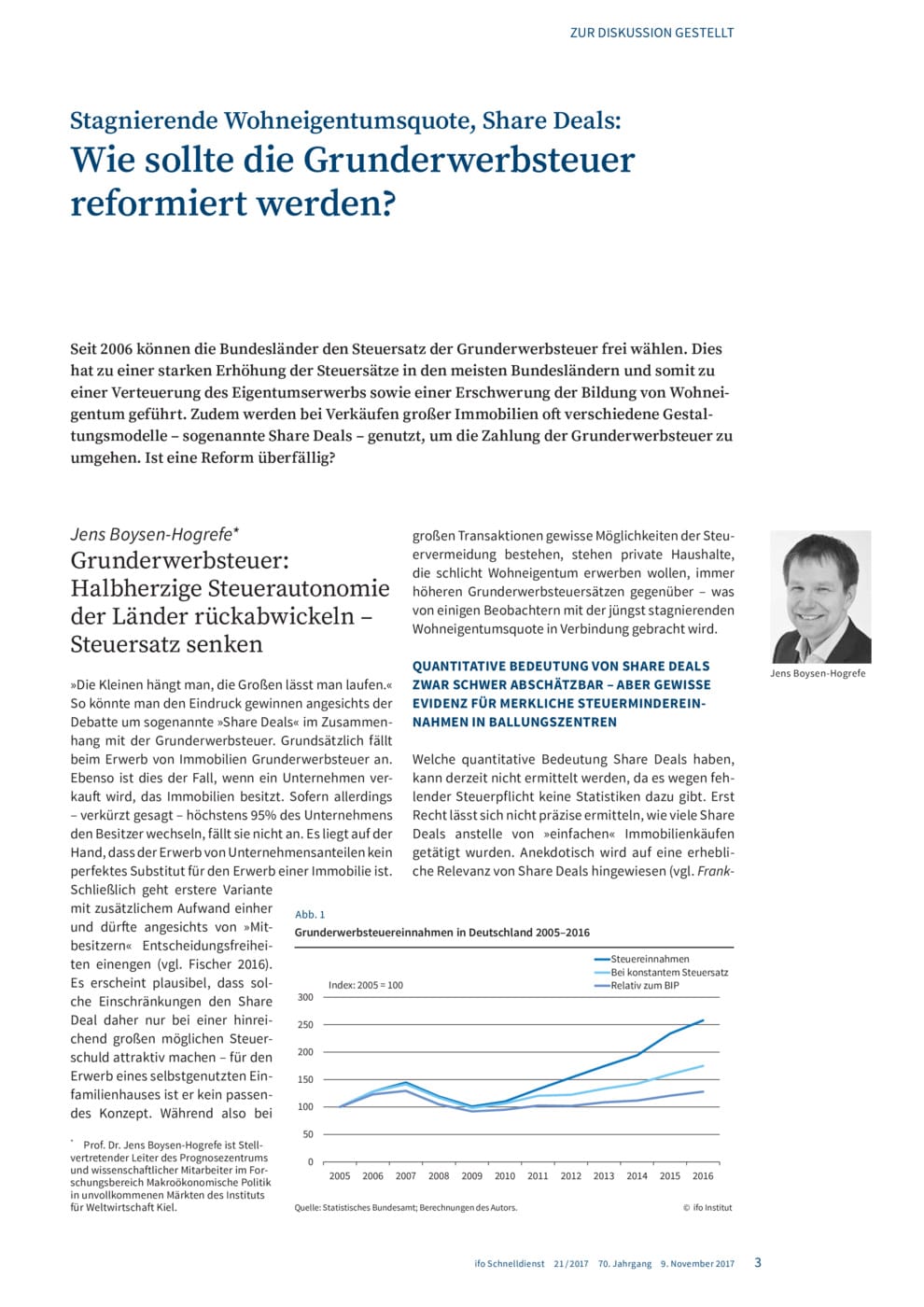Stagnating Home-Ownership Rates, Share Deals: How Should Land Transfer Tax Be Reformed?
ifo Institut, München, 2017
ifo Schnelldienst, 2017, 70, Nr. 21, 03-24

As of 2006 Germany's federal states have been free to set their own land transfer tax rate. This has led to a sharp increase in tax rates in most federal states, which, in turn, has pushed up the price of home-ownership, and made the acquisition of property more difficult. In addition, sales of larger pieces of real estate are often completed due to different models - or so-called share deals – aimed at bypassing payment of land transfer tax. Is a reform overdue? Jens Boysen-Hogrefe, Institut für Weltwirtschaft, Kiel, proposes repealing the "Länders' half-hearted tax rate autonomy" and introducing a nationwide tax rate that is markedly below the current average rate for the Länder. This could be one way of counteracting tax avoidance options via share deals. Wolfgang Scherf and Carolin Dresselhaus, University of Gießen, assert that land transfer tax cannot be justified through fundamental taxation principles or favourable steering effects. Their substitution effects have distorted decisions in the real estate sector and have caused unnecessary additional economic burdens beyond taxes payable. Allocative and distributive shortfalls in land transfer tax would speak for a reform. Thomas Schäfer, Finance Minister of Hessen, doubts whether a low land transfer tax is correlated with a high home-ownership rate. He also sees no direct relation with home-ownership subsidies and the fight against share deals. It may be tempting to announce comprehensive measures that are subsequently to be financed by additional revenues from share deal taxation. However, this could not be validly quantified since there is a lack of corresponding basic data. The taxation of share deals per se is a fiscal justice imperative. Kunka Petkova, Vienna University of Economics and Business, and Alfons Weichenrieder, Goethe University of Frankfurt am Main, discuss calls for a family component in land transfer tax and present potential alternatives to restricting tax planning via share deals. They advise against a family component. As far as share deals are concerned, they discuss several conceivable options for structuring them. If politicians wish to restrict the most obvious forms of these deals, a second alternative criterion could be introduced alongside the restriction of what percentage of the asset value qualifies for tax. Share deals could also qualify for tax relief if the real estate asset were only to play a minor role in the overall balance sheet assets of the company it was transferred to. In the opinion of Reiner Holznagel, the German Association of Taxpayers, and Jens Lemmer, Deutsches Steuerzahlerinstitut, hardly any other tax is as urgently in need of reform as land transfer tax. It is increasingly constraining home-ownership, complicating old-age provision, leading to inflationary multiple burdens and is also problematic from a distribution policy point of view. These serious flaws have aggravated the sharp increase in taxation rates. As a result, they see a reform of the land transfer tax, which makes it more difficult to acquire property, as long overdue. A reform should focus on making home acquisition less expensive for citizens. In the mid-term, however, the federal states should also reduce tax rates considerably. Manuela Krause, ifo Institute, and Niklas Potrafke, ifo Institute and Ludwig Maximilian University of Munich, show that there are several differences in terms of the economic policy pursued by Germany's mainstream political parties. The land transfer tax is one of instance of the right-wing and left-wing federal state governments still pursuing markedly different policies. Right-wing state governments tend to increase their land tax rates less frequently than centre coalition and left-wing state governments.